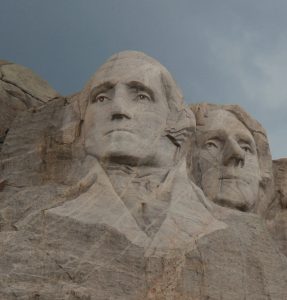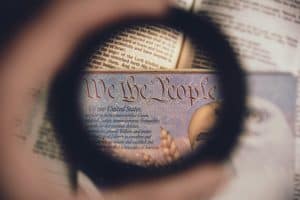Equipping Members of the Next Generation of Christians to Defend Their Faith and to Embrace a Biblical Worldview, Part 11b
You can find links to all the articles in this series here.
Last time we listened in on a conversation between Alan Wilson and his pastor, Matt Thomas. Alan was trying to sort through the challenges to his faith he’d experienced during his first semester in college. Pastor Matt helped him see that even though many people today claim that a belief in right and wrong is “religious” and therefore not valid in the real world, a belief that right and wrong don’t exist is just as religious.
Even though many people today claim that a belief in right and wrong is “religious” and therefore not valid in the real world, a belief that right and wrong don’t exist is just as religious.
Neither position, or the worldview of which it is a part, can be proved beyond a shadow of a doubt. The question is, Which worldview is evident beyond a reasonable doubt? While a belief in absolute truth has theistic implications, one that denies absolute truth has atheistic implications. Again, both of these are faith-based presuppositions.

Many elements set the Christian worldview apart from other belief systems, but two that are especially significant are
- the God of the Bible exists, and
- He created, and creates, human beings in His own image.
Last time we considered God’s existence. For the moment, our focus was not on what the Bible teaches about His many attributes, but we did say His existence and His being the source of human life makes people accountable to Him.
As we soon will see, the many qualities that set human beings apart from the animal and plant kingdoms have a great deal to teach us.
Join me as we embark on a remarkable journey of discovery.
Element Two: People Are Special Because God Makes Them in His Image
With the previous post as background information, I’d like to focus now on what it means for human beings to have been made in God’s image, or, in Latin, the imago Dei.
The principle that God has made, and makes, people in His image does a great deal more than set people apart. It also carries implications for how individuals, groups, and even governments should regard and treat God’s highest creation.
Theologian and pastor James Montgomery Boice says the imago Dei means

that men and women possess the attributes of personality, as God himself does, but as the animals, plants, and matter do not. To have personality one must possess knowledge, feelings (including religious feelings), and a will. This God has, and so do we. We can say that animals possess a certain kind of personality. But an animal does not have reason as men do; it only reacts to certain problems or stimuli. It does not create; it only conforms to certain behavior patterns, even in as elaborate a pattern as constructing a nest, hive, or dam. It does not love; it only reproduces. It does not worship. Personality, in the sense we are speaking of it here, is something that links man to God but does not link either man or God to the rest of creation.1
These observations, as helpful as they are, only begin to scratch the surface. Dr. Boice goes on to mention the connections human beings have to morality and spirituality as well. Like personality, these also are found only in the human family; not in animals or plants.2
Three Basic Approaches
Let’s take a step back and look at this issue a bit more broadly. Summit Ministries President Jeff Myers explains that over the years, theologians and scholars have developed and taught three basic perspectives on the meaning of imago Dei.

- Having been made in God’s image, we resemble Him, although not physically, for God is spirit. This does not mean we are godlike, but that we are like God in significant ways that also make us distinct from animals. We have the ability to communicate with words in both verbal and written forms, as well as the capacity to think and reason. We are emotional creatures capable of experiencing a wide range of feelings. Also, we have decision-making abilities, and we have an innate sense of morality and ethics. Because these traits primarily are descriptive of who we are rather than actions we take, this perspective often is often an ontological view.
- As human beings, we are capable of engaging in relationships; we have the ability to relate to one another. This alludes not only to God’s relating to us, but also to our our reflecting His relational nature within the triune Godhead itself.
- Men and women also have the ability to rule. Genesis 1:26-28 declares,
26 Then God said, “Let Us make man in Our image, according to Our likeness; let them have dominion over the fish of the sea, over the birds of the air, and over the cattle, over all the earth and over every creeping thing that creeps on the earth.” 27 So God created man in His own image; in the image of God He created him; male and female He created them. 28 Then God blessed them, and God said to them, “Be fruitful and multiply; fill the earth and subdue it; have dominion over the fish of the sea, over the birds of the air, and over every living thing that moves on the earth.”
Thus, one of the ways in which we bear God’s image is in our exercise of appropriate authority.
Notice how, as we have considered these explanations of being made in God’s image, we have moved from an emphasis on being to an emphasis on doing. Note also that these three perspectives aren’t contradictory but are quite compatible. We reflect God’s image in both our innate qualities and in the actions we take to fulfill appropriate roles and responsibilities.3
True in the Real World
In the biblical worldview, human beings are special. This contrasts sharply with the belief that all there is resulted from material and random forces over many eons. Yet what do we see when we look around us? We see that indeed, human beings are unique and special in countless ways consistent with biblical teaching.
Here are thirty-one qualities of human beings that set the human race apart from plants and animals, and that testify to God’s having made people in His image.

- People are creative.
- They can take initiative.
- People are productive. They are capable of constructive work.
- People need periodic rest, but here we are not speaking merely of sleep. They enjoy recreation and leisure.
- Human beings have a sense of humor and enjoy laughter.
- They can be competitive, and not just selfishly competitive, either. “Friendly competition” can enhance friendships.
- Speaking of friendships, these are unique in the human family.
- People can plan, setting goals and working to achieve them.
- Human beings can weigh the pros and cons of various situations, and
- they make decisions based on their assessments, exercising free will.
- Men, women, boys, and girls communicate meaningful messages through language, in both oral and written forms.
- People form communities, organizing themselves in systematic units such as neighborhoods, cities, and towns.
- Chief among the social units unique to human beings is the family, designed by God.
- People have the ability to love, and here we’re not talking merely about a sexual drive or desire. We primarily mean a sense of commitment to another person that motivates the people in the relationships. This dedication further instills self-sacrifice and strengthens relational bonds.
- Marriage is unique among human beings. The marriage relationship, a lifelong commitment of one man and one woman, is a special bond that represents and reflects God’s nature in ways that an individual man or woman cannot. In other words, the image of God is represented more fully and completely in a marriage relationship than it is seen in either the man or woman alone.4
- Even though animals and plants reproduce and their offspring grow, the healthy development of human children is enhanced by balanced parenting—both the strong, protective influence of a father and the nurturing touch of a mother.
- People possess intense likes and dislikes that often are shared. They love and appreciate beauty while hating and abhorring ugliness.
- Taking item #17 one step further, individual persons have tastes and preferences, likes and dislikes. Many times these preferences aren’t shared; they’re unique to one individual or to small groups of people.
- Music sets the human family apart from all other living beings.
- People possess an innate sense of moral values. They readily appeal to ideals such as justice, fairness, and integrity.
- They therefore have an awareness of right and wrong and can understand the concept of sin.
- People cherish and exercise inherent rights, including but not limited to the rights of freedom of speech, freedom of expression, freedom of worship, and freedom to own and manage property.
- Elaborating on the last freedom named in item 22, only human beings can appreciate or exercise property rights in their fullest sense.
- Only human beings wear clothes.
- Humans have the ability to empathize, understanding the viewpoint of another individual. Significantly, this is true in even in numerous situations in which the one emphasizing has had very different experiences from those of the other person in the relationship. Of course, some are better at empathizing than others.
- People have the ability to perceive concrete ideas, but they also
- have the ability to understand abstract concepts and ideas.
- People can recognize the value of deferring pleasure and even making sacrifices for the greater good, and of taking risks for the benefit of others.
- Only human beings can be passionate for ideals and idealistic causes.
- People can be generous, freely giving of themselves and their resources for noble causes.
- Human beings are not beholden to their base impulses, even though they have them. They can recognize value in exercising self-control (not doing what comes naturally) and self-discipline (doing what doesn’t come naturally).
This list is available as a reproducible PDF download here.
Random Forces Couldn’t Have Given Rise to the Human Race
Now, this list is not exhaustive—not by a long shot! It still is helpful, though; review it and ask yourself, Can these traits or qualities have resulted from mere chance—random forces at work over many millions of years? Even if (and this is a really big if, but for the sake of conversation, let’s imagine it) random, evolutionary forces resulted in life, how could these forces have given human beings such abstract, idealistic qualities? How could any sense of morality and ethics emerge from random, material forces?
If material and random forces resulted in human life, how is it that human beings have an innate sense of morality, ethics, and fairness?
No, humanity isn’t perfect, and the biblical worldview explains why. People are fallen and evil. Even so, they still are great and are markedly different from animals, plants, and basic materials. Humanity’s fall into sin marred but did not eliminate God’s image in each person. The most reasonable explanation for the uniqueness of the human race is that its members were and are created by a personal and relational God who stamps His likeness on each one.
The most reasonable explanation for the uniqueness of the human race is that its members were and are created by a personal and relational God who stamps His likeness on each one.
Applying the Biblical Worldview
Although they didn’t think of it in these terms, the Founders of the United States of America recognized these two elements of the biblical worldview, took that worldview seriously, and applied it in practical ways when they founded the new nation. We see this so clearly in the Declaration of Independence, which was drafted and adopted in 1776.
We hold these truths to be self-evident, that all men are created equal, that they are endowed by their Creator with certain unalienable Rights, that among these are Life, Liberty and the pursuit of Happiness. — That to secure these rights, Governments are instituted among Men, deriving their just powers from the consent of the governed, — That whenever any Form of Government becomes destructive of these ends, it is the Right of the People to alter or to abolish it, and to institute new Government, laying its foundation on such principles and organizing its powers in such form, as to them shall seem most likely to effect their Safety and Happiness.

The early leaders and statesmen of the new nation—George Washington and Thomas Jefferson among them—understood that the human race truly is great, but fallen and imperfect. Not all were Christians, but virtually all held to a Christian perspective on life and the world.
With the Declaration of Independence and the Constitution with its Bill of Rights soon thereafter, the Founding Fathers wove into the fabric of the new republic an official recognition of people as creatures of inherent dignity and worth originating from the Creator God. Yet they also crafted a government with checks and balances to prevent those in authority from attaining too much power. They knew that, like liquor, too much power can and will overwhelm and corrupt even well-meaning men.
Rights and Responsibilities
Therefore, the Founders didn’t just affirm rights, but also responsibilities. Let us not miss the truth that free market capitalism was foundational to the freedoms the new government was charged to protect. This isn’t a popular concept today, because capitalism is vilified, maligned, and extremely misrepresented and misunderstood. Yet, even before the United States officially existed, American settlements validated the virtues of a free market economy.
While many believe government exists to meet people’s needs, Scripture teaches individual responsibility. So does history. Settlers in both Jamestown and Plymouth initially sought to produce food and wealth according to a communal system. Workers contributed the fruits of their labors to a “common store” on which all relied. This approach pushed both settlements to the brink of starvation. Yet when land was assigned and people could reap the benefits of their own work, the communities prospered.
The Bible commends reward for hard work among able-bodied people. Proverbs 14:23 says, “In all labor there is profit.” Paul told the Thessalonians that whoever wouldn’t work shouldn’t be allowed to eat (see 2 Thess. 3:10), and he told Timothy that “if anyone does not provide for his own,…he…is worse than an unbeliever” (1 Tim. 5:8). It isn’t government’s job to meet the people’s needs. That job belongs to the people themselves.
Americans, and especially Christians, must rediscover and uphold these virtues, including the benefits capitalism affords every citizen. It endows both producers and consumers of goods and services with both privileges and expectations, rights and responsibilities. Both of these are consistent with the biblical view of humanity as great, but fallen and in need of personal “checks and balances.”
For more information on capitalism, please take time to watch these four concise yet highly informative videos from Prager University.

Not Just About Salvation
America’s Founders obviously didn’t apply biblical principles perfectly. Slavery was a part of the fabric of life during that era, and it would continue in the United States for nearly a century longer. Even so, even when the nation started, the Founders laid the groundwork for the eventual elimination of slavery.5 More to the point here, with the Declaration of Independence and the US Constitution, they affirmed the God-given rights of the people and established that government’s role was to protect and maintain those rights.6 This was profound, especially for that era! We must understand that it was and is rooted in a Judeo-Christian perspective, one that Christians need to rediscover and apply today.
Christianity, you see, isn’t just about establishing and living in a right relationship with God.
It’s about everything else as well!
Copyright © 2018 by B. Nathaniel Sullivan. All rights reserved.
Related article: The High Cost of Denying the Obvious, Part 2: God Speaks Clearly Through Nature
Notes:
1James Montgomery Boice, Genesis: An Expositional Commentary, Vol. 1, Genesis 1:1–11:32, (Grand Rapids: Zondervan, 1982), 77-78.
2Ibid., 78.
3Jeff Myers, Understanding the Faith: A Survey of Christian Apologetics, (Colorado Springs, CO: David C. Cook, 2016), 196-197.
4As we said in Upholding God-Ordained Marriage Is One of the Greatest Ways to Uphold the Gospel, Part 10
Within the Godhead…we see both unity and diversity. Not coincidentally, while both men and women are equal in worth and are equally made in God’s image, men reflect His image in a variety of ways that women typically do not, and vice versa. Let’s put it another way. Men and women are both human, yet they are different (also go here, here, and here); there is unity and diversity among them. These are God’s “fingerprints” on His highest creation! The fact that human beings consist of both males and females represents not only the wide range of ways people showcase God’s image, but also the unity and diversity that coexists within the Godhead.
These truths lead us to an inescapable conclusion. While all people, both males and females, are made in God’s image, the one-flesh nature of man-woman marriage reflects His image in ways no individual man or woman can—and in ways no same-sex couple can, whether the state says they are “married” or not. Here we are in no way equating singleness with same-sex marriage. Rather, we’re upholding man-woman marriage as uniquely able to reflect the broad range of ways God’s image is evident in human beings. This is especially critical for children, whose first impressions about God come from their parents.
5Please see the Word Foundations series The Importance of Getting History Right: Uncovering the Truth About Racism at the Founding of America and Beyond.
6Please see the Word Foundations series Misinformed and Misled: How a Distorted Perspective on Rights Is Leading America Into Tyranny.
Unless otherwise indicated, Scripture passages have been taken from the New King James Version®. Copyright © 1982 by Thomas Nelson, Inc. Used by permission. All rights reserved.
top image: Photo by Clem Onojeghuo on Unsplash


Be First to Comment